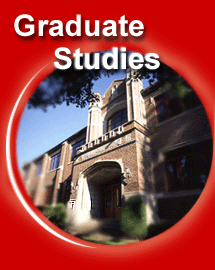| |
Research
Centers and Programs have a dual mission of education as
well as research and development. Emphasis is placed on
the research process. Projects reflect faculty/student interests
and industry needs. Equipment and facilities are up-to-date
and appropriate to the task. Graduate students (except engineering
management) are required to participate in thesis research
and many find opportunities within the centers and programs
outlined below or through individual faculty research interests.
Center
for Applied Optics Studies
The
Center for Applied Optics Studies serves as a high-technology
resource service for business, industry and government.
Every time you listen to music on a compact disc player,
place a telephone call, printout a document on a laser printer,
and have your groceries scanned at the checkout you are
using optics. In a world where optical devices and components
such as lasers and optical fibers are used in so many varied
applications, optical technology is literally everywhere.
The Center works to identify and implement new, practical
uses for optics. A few of the Center's specialty areas include
the design of optics-related products and instruments, non-destructive
testing, vibration analysis, fiber optic component/system
testing, biomedical instrumentation, surface roughness measurements,
computer-aided optical system design, measurements using
lasers, spectroscopic analysis, image enhancement, remote
sensing, applications of photo-refractive materials, sensing
devices and laser beam steering applications.
Lilly
Applied Life Sciences Center
This
Center was formed as an academic-industry partnership in
May 1995 in response to the need for applying advanced new
technologies from engineering and the biological sciences
in developing tomorrow's effective and efficient health
care solutions. The Center assists Rose-Hulman in providing
more interdisciplinary opportunities for faculty and students
to work together on state-of-the-art projects similar to
activities occurring in life science-related industries.
ALS Research Center goals are to introduce undergraduate
students to biological and biomedical research; perform
high-quality research to prepare graduate students for careers
in biological and biomedical engineering; establish new
contacts between Rose-Hulman Institute of Technology and
biomedical and health care industries; and perform high-quality
research in cooperation with industry in order to provide
solutions to problems requiring time or expertise not available
to its permanent staff.
W.
M. Keck Foundation Imaging Systems Laboratory
Imaging
has numerous applications. For example, it is used to visualize
experimental data; to non-invasively explore the human body
(e.g. ultrasound, X-rays and magnetic resonance imaging);
to measure and reconstruct 3D objects (e.g. buildings);
to visually guide autonomous vehicles; and for entertainment
(e.g. movies and games). The Imaging Systems Lab provides
opportunities for interdisciplinary collaboration in all
areas of imaging including computer graphics, computer vision,
optical imaging and filtering, image processing, and pattern
recognition. The laboratory's goals are to provide high
quality opportunities for students to work on imaging projects;
educate students in the various aspects of imaging; establish
links between Rose-Hulman and companies that have a need
for imaging-based solutions; and provide industry with solutions
to imaging problems.
Technical
Assistance & Services Center
In
1993 the Technical Assistance & Services Center (TASC) was
established to provide technical assistance and services
to business, industry and entrepreneurs. Over the years,
TASC established a niche in new product development, producing
prototype hardware and software for clients. In 2000 TASC
operations became part of Rose-Hulman Ventures located at
Aleph Park.
The
TASC New Product Development Labs, TASC.NPD Labs, at Rose-Hulman
Ventures continue to offer a multi-disciplinary approach
to design, development, fabrication and testing of new product
prototypes that can increase competitiveness and productivity
of businesses. It uses a full-time staff of experienced
engineers and scientists, in addition to drawing on the
creativity of the young students and the expertise of the
faculty of Rose-Hulman. TASC.NPD Labs can develop new products
involving biomedical devices and instrumentation, optical
design and instrumentation, e-commerce solutions, electro-mechanical
systems, software, electronics, embedded processors etc..
Engenius
Solutions
Engenius
Solutions works with inventors and entrepreneurs from Rose-Hulman,
Indiana and the Midwest to develop, design, commercialize
and market new ideas and inventions. The program is run
by four student managers that answer to a board of faculty
and staff advisors. Engenius Solutions will nurture,
support, and develop entrepreneurs and the entrepreneurial
spirit through project management and, if appropriate,
commercialization of inventions originating from Rose-Hulman
students, faculty and staff as well as outside inventors.
Student development teams engineer product prototypes and
market the products to companies and entrepreneurs in order
to disseminate them into the market place. The program
places a strong emphasis on the educational benefit to
undergraduate and graduate engineering and management
students.
|

